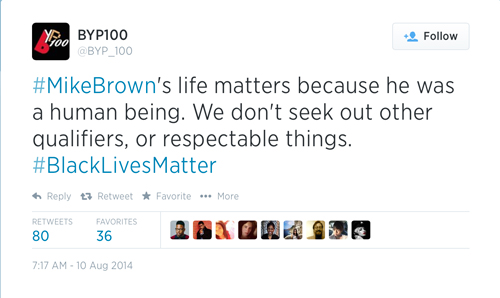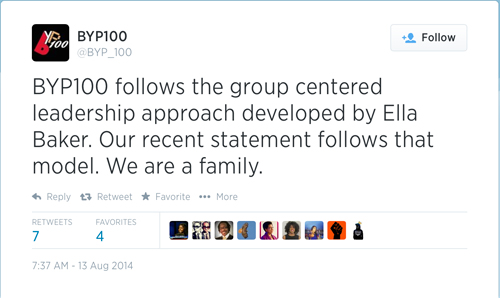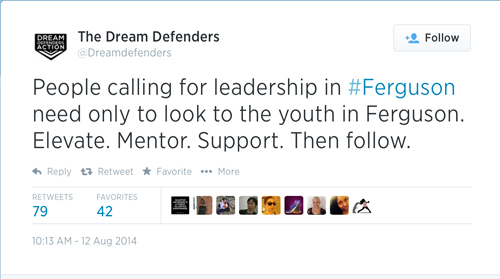In this issue, Mychal Denzel Smith writes about a new wave of civil-rights activism, driven by young people of color taking advantage of digital media. He focuses in particular on the Black Youth Project 100, the Dream Defenders and the Million Hoodies Movement for Justice. The killing of Michael Brown in Ferguson, Missouri, on August 9 showed these groups ready to respond.
 The Black Youth Project 100 (BYP100) is a “member-based organization of Black 18-35-year-olds, dedicated to creating justice and freedom for all Black people.” The group was founded in 2004 as part of a research project studying African-American youth.
The Black Youth Project 100 (BYP100) is a “member-based organization of Black 18-35-year-olds, dedicated to creating justice and freedom for all Black people.” The group was founded in 2004 as part of a research project studying African-American youth.
It has since evolved into an activist organization. Following the Ferguson shooting, BYP100 unleashed a series of tweets condemning the killing, as well as the respectability politics that put the victim on trial.


BYP100 released a powerful declaration of its commitment to tireless, militant activism. “Patience and properness have their place, and their place is in the past. We reject sanitized portrayals of Black liberators which are used to manipulate us into apathy and inaction.”
Charlene Carruthers, the national coordinator of BYP100, has been on the ground in Ferguson since August 20, helping to organize young black people locally.
 The Dream Defenders “develop the next generation of radical leaders to realize and exercise our independent collective power; building alternative systems and organizing to disrupt the structures that oppress our communities.” The organization was founded in 2012 when a group of young people marched for three days from Daytona Beach to Sanford to demand justice for Trayvon Martin. It now boasts 28,000 Twitter followers and 31,500 followers on Facebook.
The Dream Defenders “develop the next generation of radical leaders to realize and exercise our independent collective power; building alternative systems and organizing to disrupt the structures that oppress our communities.” The organization was founded in 2012 when a group of young people marched for three days from Daytona Beach to Sanford to demand justice for Trayvon Martin. It now boasts 28,000 Twitter followers and 31,500 followers on Facebook.
In the wake of Michael Brown’s death in Ferguson, the group declared the importance of youth-led resistance:

Then, on August 14, the Dream Defenders occupied Miami’s federal justice building with their hands up, representing Michael Brown’s position when Darren Wilson shot and killed him. They demanded a meeting with US Attorney Wifredo Ferrer, who oversees the Southern District of Florida, to discuss Brown and Israel Hernandez of Miami Beach, who was killed by police in 2013. When Ferrer turned them down, eight Defenders refused to leave and were arrested.
 The Million Hoodies Movement for Justice is “a national organization with over 50,000 members working to protect and empower young people of color from racial profiling and senseless gun violence through creative technology, strategic communications and grassroots power building.” The organization was founded in March 2012 in response to Trayvon Martin’s shooting. Million Hoodies collected 2 million signatures demanding the arrest of George Zimmerman, creating the fastest-growing online petition in history.
The Million Hoodies Movement for Justice is “a national organization with over 50,000 members working to protect and empower young people of color from racial profiling and senseless gun violence through creative technology, strategic communications and grassroots power building.” The organization was founded in March 2012 in response to Trayvon Martin’s shooting. Million Hoodies collected 2 million signatures demanding the arrest of George Zimmerman, creating the fastest-growing online petition in history.


